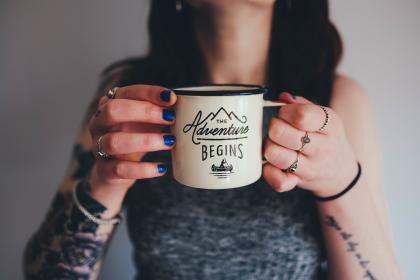Getting Sober Without AA: My Focus For the First Few Years of Recovery

AA just wasn’t on my radar.
I was a helping professional and it was hard enough to admit I had a problem with substances and wasn’t coping well with life. I wanted so badly to be able to figure it out alone. However, my substance use and mental health came to a head through suicidal ideation so I needed to get help. And fast.
With the help of a friend, an appointment was scheduled with a therapist and I was driven to the appointment to make sure I went to it. I was relieved. Relieved to finally be getting the help I so desperately needed yet was denying myself.
Funny thing denial. I denied my problem and then denied the solution for a very long time.
I continued deep work with my therapist. At first, I tried to reduce my use. It wasn’t working for me. It took months for me to decide that I would engage in abstinence. More and more consequences lead the my decision to give it all up. We discussed getting off of substances for a year so I could address my emotional and mental instability. We would then re-evaluate and make choices from there.
Side note: I never went back to using alcohol or drugs. The life I created for myself was worth far more to me than the life I had while using substances.
I continued on my path to getting sober without AA by attending a Master’s degree program in Spiritual Psychology.
What did I focus on during that first year of recovery?
1. Created my own support community
My support system included a therapist, a mentor, classmates and a spiritual community via my Spiritual Psychology program.
2. I learned how to become mindful of my thoughts, feelings and behaviors
I became the owner of my reactions and used my patterns for spiritual growth.
3. I learned new coping skills to deal with my thoughts and feelings
Self-compassion, self-respect and self-forgiveness became my new way of being with myself.
4. I learned how to create a self-nurturing practice
As I learned to love myself, I formed a daily practice that would support myself and my recovery process.
5. I learned how to change my thinking
I quickly new that my negative self-talk and judgments had to change so that I could sustain my recovery.
What did I focus on during that second year of recovery?
1. I worked on my relationship with my family
I focused on bring my self-love to all my interactions with family and saw family relationships transform.
2. I worked on developing a relationship with an intimate partner
I had been a serial dater while using substance yet wanted a healthy relationship with a healthy partner.
3. I healed old memories and unresolved issues
I brought my awareness, my diligence and my loving to any and all issues that disturbed my peace so that I could experience acceptance in my life.
4. I engaged a passion project
As I started to reconnect with myself, my creative expression started to come through writing, new hobbies and a passion project that lead me overseas.
5. I used my life as an example of transformation
I shared and continue to share my learnings and insights with others healing from substance use, mental health and trauma so that people can realize that their life’s challenges are meant for self-actualization.
Getting sober without AA is definitely possible when you have the right system, support and accountability in place for you. There are lots of support people available out there such as: Recovery Life Coaches, Therapists, Substance Abuse Counselors, Peer Recovery Coaches and higher level of care through Intensive Outpatient Programs, Partial Hospitalization Programs and Inpatient Residential Programs.
It’s really important to know that you don’t have to go it alone. You don’t have to do recovery the way other people are doing it, but you do need to create your own support system. Need help developing your own support system, working through year one focuses or working through year two suggestions? Feel free to set up a free 60 minute Alternative Recovery Plan Strategy Call with me so that you can get clear on your vision, what’s stopping you from moving forward now and your specific next steps. We are all different so surround yourself with people who created their own path and devote their lives to lifting other people up.
There are many paths to recovery. Let’s find the right path for you.